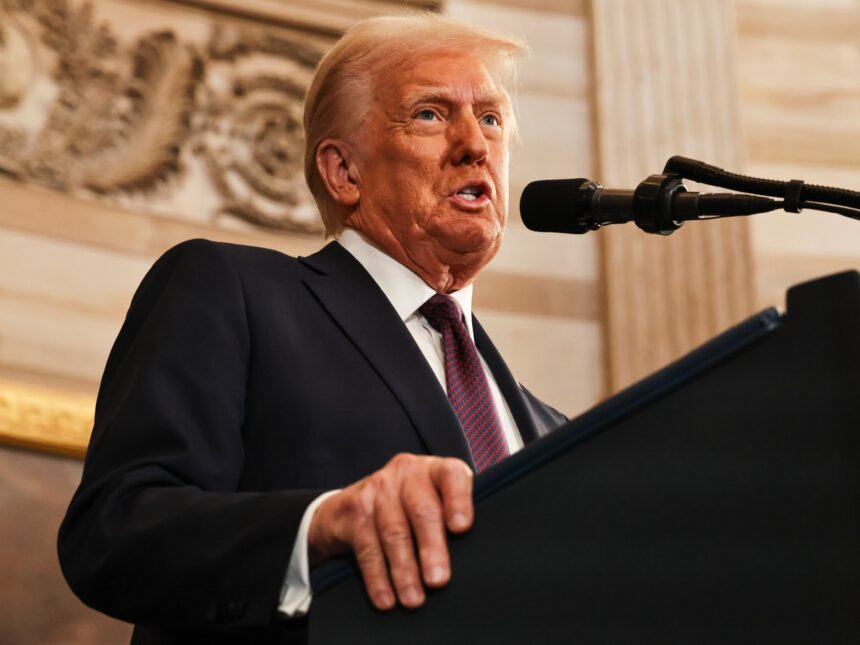During his first day as President of the United States, Donald Trump refrained from imposing tariffs in a bid to lower energy prices and control inflation. However, it remains uncertain whether his executive actions will be sufficient to achieve the economic growth he has promised.
As a candidate, Trump had vowed to impose tariffs of 10 to 20 percent on all imports, with potential rates of up to 60 percent on imports from China. He also threatened to impose a 25 percent tariff on imports from Canada and Mexico if they did not address the flow of illegal drugs and migrants entering the US.
Although these threats did not materialize on his first day in office, experts cautioned that they have not been completely discarded.
Trump announced the establishment of an External Revenue Service to collect tariffs, fees, and revenues from foreign sources. “It will be a substantial amount of money,” he declared in his inaugural speech.
“While he chose not to immediately impose tariffs that could later be negotiated away, the aim of the Trump administration and the Republican Party to generate tariff revenues indicates that the threat of tariffs still looms,” explained economic and political risk expert Rachel Ziemba.
Although Trump is set to sign an executive order to prioritize reviewing trade relationships, including initiating a review of the US-Mexico-Canada trade agreement, the absence of tariffs on the first day suggests a phased approach rather than an immediate imposition, according to Ziemba.
In regards to China, Trump’s team is expected to focus on a deal from his previous term that required Beijing to make substantial purchases of US resources to address the trade deficit between the two countries, a commitment that was not fulfilled.
“By focusing on these purchases, Trump gains negotiating leverage and addresses concerns about market pressure and potential negative impacts of broad tariffs,” Ziemba added.
‘Drill, baby, drill’
Another major theme on Trump’s first day was the increase in US oil and natural gas production, with Trump declaring his intention to declare a national energy emergency.
“America will become a manufacturing powerhouse once again, with the largest reserves of oil and gas in the world. We will utilize it to the fullest,” Trump stated in his inauguration speech. “We will drill, baby, drill.”
Under former President Joe Biden, US oil and gas production reached record levels as companies pursued higher prices following sanctions on Russia after its invasion of Ukraine in 2022.
Trump also pledged to replenish the US Strategic Petroleum Reserve and boost energy exports worldwide. Biden had sold a record amount of crude oil from the reserve to stabilize petrol prices during the Ukraine-Russia conflict, depleting the reserve to its lowest level in 40 years.
During his first term, Trump had promised to refill the reserve to support domestic oil companies during low demand caused by the pandemic, a promise that was not fulfilled.
Trump also announced the revocation of what he referred to as an electric vehicle mandate, citing it as a measure to save the US auto industry.
While there is no mandate from Biden requiring the purchase of electric vehicles, his policies have aimed to promote EVs and encourage the shift from petrol-powered to electric cars.
“The common thread is the unleashing of affordable and reliable American energy,” stated an unnamed Trump official. “Energy impacts every aspect of the economy and is crucial for national security and asserting American energy dominance globally.”
Trump emphasized the importance of energy in the artificial intelligence arms race with China and other nations, highlighting the industry’s high power demands as a national priority.
According to the Department of Energy, US data center power demand is projected to triple in the next three years, representing up to 12 percent of the country’s electricity consumption due to advancements in artificial intelligence and other technologies.
In his previous administration, Trump had considered using emergency powers to support the coal industry but did not follow through. This time, emergency powers could be utilized to ease environmental restrictions, expedite the construction of new power plants, streamline permitting for transmission projects, or open federal land for data centers.
Trump is also expected to sign an order to utilize natural resources in Alaska, a contentious issue with Republicans advocating for oil and gas production while Democrats push for land preservation.










